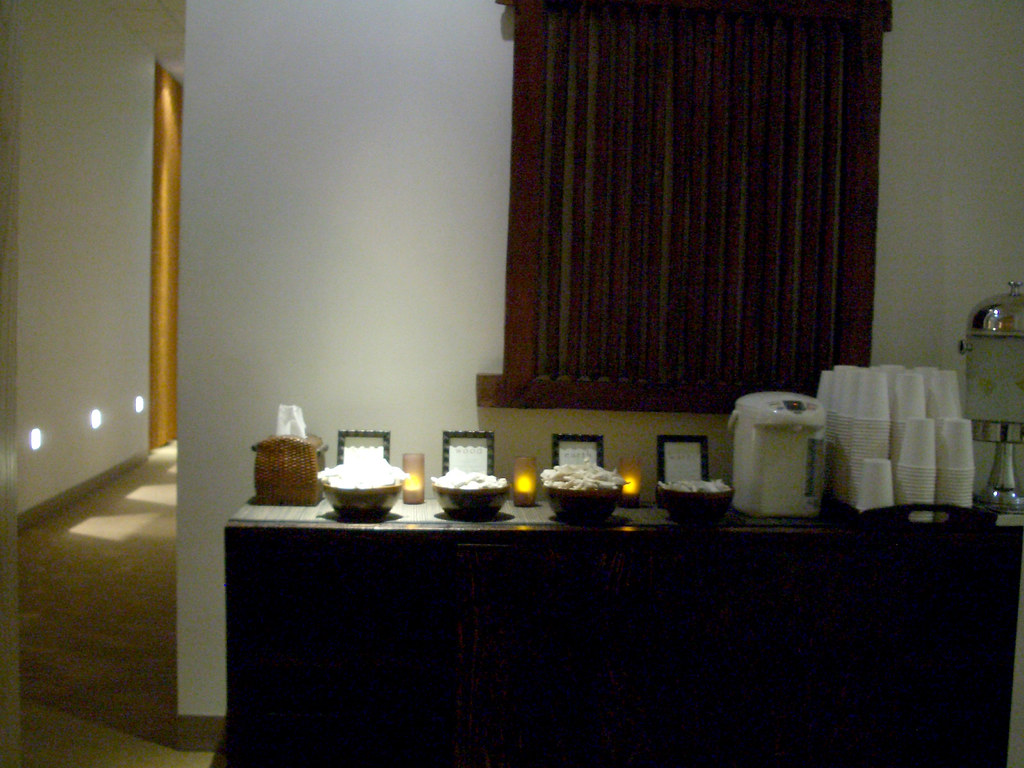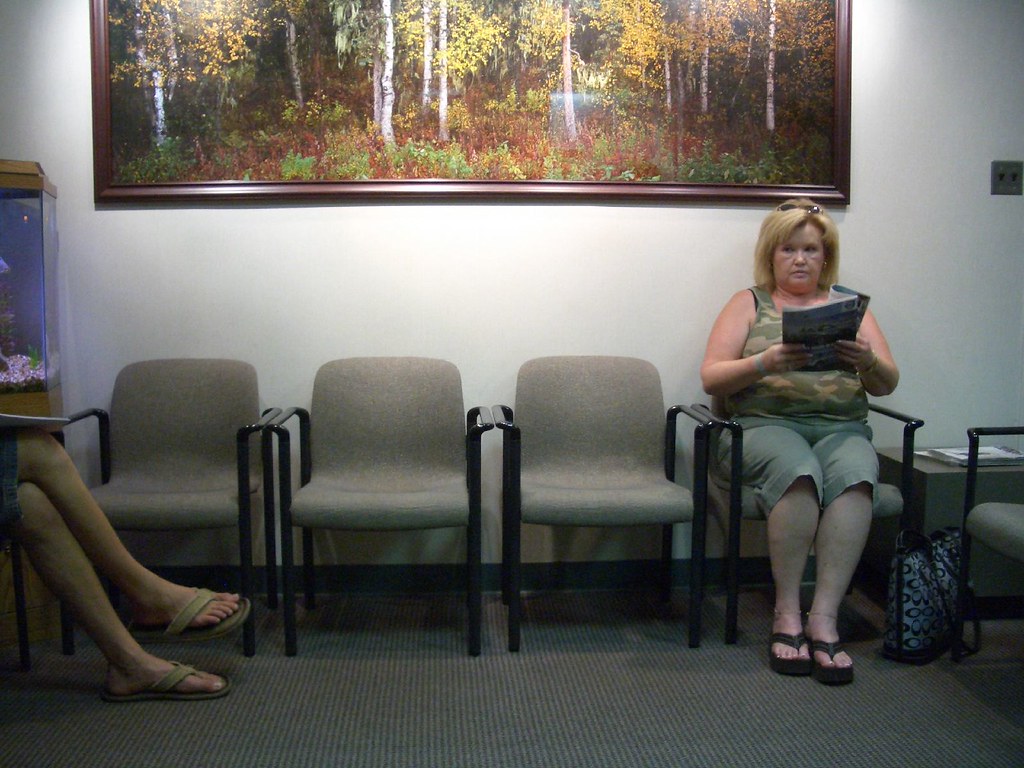 Of all the activities that we humans encounter during our lives, which activity do we like the least? Well, there's paying taxes, and there's getting punched, and there's public speaking...but I think there's something worse.
Of all the activities that we humans encounter during our lives, which activity do we like the least? Well, there's paying taxes, and there's getting punched, and there's public speaking...but I think there's something worse.We hate to wait. Oh, how we hate to wait. Just hurry it up! Come on, people! Why is everyone in front of me so slow? The fact is, our time is increasingly precious to us. Waiting is seen more as a waste of time than a necessary evil, and as peoples' expectations for convenience continue to rise, any act of waiting, big or small, becomes despicable.
And waiting causes disproportionate amounts of stress in our lives. Why is it disproportionate? Because, well, the literal act of waiting is so easy. All you do is stand there! It's not difficult, and it's not embarassing, and it's not painful. But my god, does it get our blood boiling.
The strangest thing about waiting is that it tends to distort reality. You may have been standing there for three minutes and feel certain that ten have gone by. If time flies when you're having fun, time sure drags when you're waiting. So retailers talk about "perceived wait time" rather than actual wait time, because frankly, the former is much more important.
You would think we might adapt, find ways mitigate our stress. Perhaps we could just stand patiently while the cashier tries to do a price check and nobody in pharmacy is answering the phone. Or we could sit calmly while other patrons come and go, the time of our actual appointment creeping farther into the past. We could pass the time with a cellphone call, but our fellows-in-waiting wouldn't like it. We could be productive, we could be entertained, we could be learning, we could be socializing. We could be shopping! But usually, we're just fuming. Can anyone take us out of our misery?
---
A few companies are trying. Their strategies are all interesting, if not entirely successful. I'd like to highlight three.

exhale is a posh spa in a prosperous neighborhood. Situated in Chicago's Gold Coast, it caters to clientele who just might think their time is more precious than the time of others. People who tote small dogs and get massages twice a week. People who surely don't have time to wait.
But exhale's waiting area quickly changes that mindset. I was taken to a small, dimly lit space with four kinds of tea, a low-hanging chandelier and a long, padded bench seat. A wood-framed sign asked if I wanted a heated neck pillow. You bet I wanted a heated neck pillow. I closed my eyes, leaned my head back, and almost fell asleep.
This waiting room was so tranquil, and such a change of pace from the outside world, I actually wanted to wait. I could have sat there for hours. In five minutes I think I reached a partially meditative state. While I know this type of experience doesn't work for every business, some of the principles are good. Find ways to slow the customer down, add multiple sensory elements, remove any reminders of time, and create a diversion so pleasant that the waiting becomes a solution unto itself, rather than the problem.

The second example is less about creating the positive, and more about mitigating the negative. But I find it equally illustrative. My dermatologist is named Dr. Michael Greenberg. His waiting room is super generic - chairs in a square, family magazines and a fish tank. But as I signed in for my appointment, I noticed a little pamphlet. It was called "Why Am I Waiting?"
Dr. Greenberg is a writer when he's not a doctor, and he has kindly put together a thorough and heartfelt answer to this question. Written in the first person, it contains passages like these:
If I knew exactly what was going to happen at each patient visit, I could book an exact time slot like dentists do. But many appointments are to find out what a patient's problem is. Once I have a diagnosis, treatment time varies.
What, for example, should I do with an elderly patient who has a skin cancer that needs removal, whose only transportation is a relative who had to take time off work? Should I ask them to return to do the removal? Or should I do the procedure and risk falling behind schedule? How would you want your relative treated?
Dr. Greenberg cites emergencies, no-shows, interruptions, overbooking, and treating the patient, not just their disease, as reasons why I am waiting. After reading this pamphlet - a nice way to pass the time, I might add - I felt a newfound appreciation for his dedication, his honesty, his sense of fairness. I even felt a new solidarity with my fellow patients, as if by my own act of waiting, I was helping someone less fortunate get better care. Again, not all businesses have satisfying reasons "why I am waiting," but most could benefit from a degree of explanation. So try simply telling the customer why, and they might just become empathetic. If anything, they'll realize that your problems are worse than theirs.
The final example is equal parts innovative and evil, and I relate it here as a case of good waiting gone bad. My boyfriend recently visited CarMax. We were selling our Golf, and while friends warned us against the place, we just wanted a baseline quote. The quote was indeed terrible, but the worst part for George was the waiting. He described it like this: "I sat down with a salesman, we discussed the Golf, and then someone went to inspect it. I got up to find the waiting room, but realized that there was none! There was nothing to do but sit back down at the salesman's cubicle. For half an hour, I was subjected to his progressively persistent attempts to sell me a used car. Why their cars were a great deal, some cars I might want to consider, the fabulous CarMax warranty, and on and on."
This is nuts. I find it ridiculous to quarantine the customer, giving them no other option but to listen to your employee try to close a deal. George said he was obviously not interested, yet he was subjected to the same treatment as a willing buyer.
While I understand that CarMax is in the business of selling cars, their strategy of selling cars to anyone, even people who clearly aren't buying, is absurd. But perhaps classifying their customers would help. Letting the waiting experience be dictated by their interest. CarMax has people buying cars, and people selling cars. They could take the buyers to one side of the room, where Joe Hardsell can get right to the point. They could take the sellers to the other side of the room, where Jim Softsell can add value in other ways.
Mr. Softsell could chat openly with my boyfriend about the cars he was considering. He could give him some personal car-buying advice. He could offer him car magazines. He could let him sit in some newer models. He could take him out for a test drive! Or he could help him pass the time by turning on the TV, letting him play video games, or simply giving him the privacy to make a phone call.
CarMax has the resources to give both kinds of people a positive waiting experience. They already have the customer in a given space for a good chunk of time, and they have already allocated a full-time staffer to babysitting him. They need to find ways to make that experience positive, no matter who's doing the waiting. And in general, I wonder if it makes sense for businesses to have multiple levels of waiting. We've already got the self-checkout, the 10 items or less, and the full-cart lines. Some hospitals have different types of waiting rooms. Think about it: are you only making one type of customer wait? Or are there two or more types, with very different needs?
Whether you need to boost a positive waiting experience, lessen a negative one, or create multiple levels, please remember that waiting is an important and often overlooked part of the retail experience. The bar is currently set so low that any attempts to improve should be disproportionately appreciated.

7 comments:
A readily available magazine, preferably your own, is always my best solution. I always try to keep one in my car, just in case. Bringing this into a retailer though, is a bit silly.
When I worked as a hostess, I saw the "perceived wait time" thing in action all too often. People would come up to me, saying, "We've been waiting for twenty minutes!" I would consult my notepad and reply, "Actually sir, you only put your name in ten minutes ago." And they'd STILL get all huffy!
I'd like to think that it was the hunger that was intensifying these people's impatience, but they could have also just been jerks.
If this blog is changing its focus to your boyfriend maybe you should change the name. I realize that young women find their boyfriends to be, like, the most, you know, cool topic in, like, the world. OMG! They are not: When you get the urge to mention him, fight it.
Mario, agreed, a magazine is a good call. I often end up grabbing a People in line at the grocery store, reading it until the very last second, then putting it back. Terrible, I know.
Stacy, what an interesting concept - giving people the truth on how long they've been waiting. This weekend I waited outside (in 20 degrees) for what felt like an hour. If they had a wait clock, maybe I would have felt better, knowing that it had actually only been 20 minutes.
Anonymous, this blog is named The Curious Shopper because it's about my personal and professional observations of the retail experience. The focus is not, and never has been, on my boyfriend. I'm sorry that you perceive it that way.
I dislike waiting the most when I feel trapped, unable to do something else productive. I like the coaster pagers you get at some restaurants while waiting for a table because there is assurance you are in the queue, that you will be notified and no one else can slip in and take your place. I do wish more places would use text messages on mobile phones or show/tell me the estimated wait time so I could plan accordingly.
To anonymous: the posting about Sara's boyfriend directly related to the topic of the blog. Why are you getting so fired up?
sara - it was interesting to read your post. it reminds me about some of my own waiting experiences good and bad - the bad is finding really old issues of torn magazines at doctors' clinics when i am sure they can afford new copies. the good - paper placement mats at restaurants that engage you in cute quiz games while you wait for your food. some people believe having mirrors in the waiting area helps since people get distracted looking at themselves and the others though i personally find mirrors uncomfortable since they make the room smaller and make people conscious of their presence there.
Reshma, thanks for your thoughtful comment. My understanding of mirrors, in places like dental office waiting rooms, is that they make people comfortable. The theory is that you are more familiar with your own face than anything else, and so seeing yourself will put you at ease before a big surgery.
I also believe they make a room look bigger, though deceptively so.
However, I've thought a lot about this theory and whether it makes sense. It's definitely entertaining (and somewhat socially acceptable) to stare at other people using mirrors - this happens all the time on public transportation. But does this really help the situation? After all, now everyone can stare at you too!
I think it's a certain type of person who is comforted by a mirror, probably someone who is content with the way they look. For most people, mirrors increase self-awareness and therefore discomfort. Mirrors in waiting rooms, while an interesting concept, are probably not a good idea.
Post a Comment